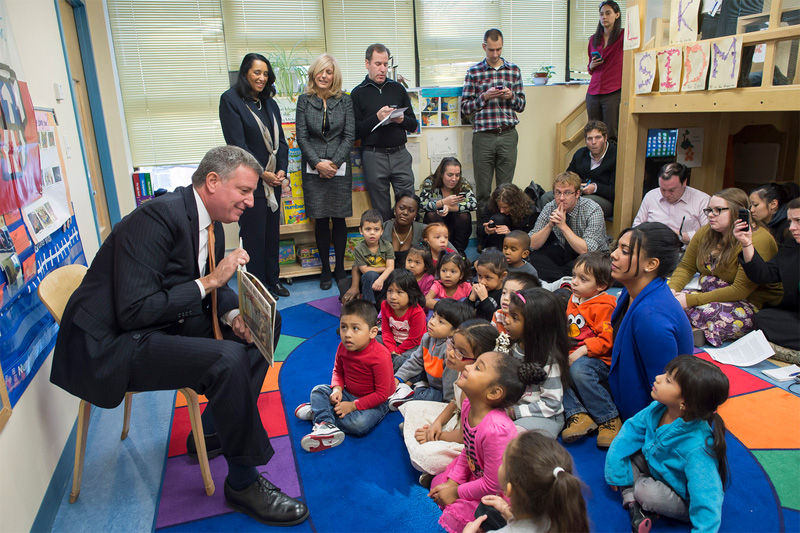Secondary Navigation
City Releases Implementation Plan For Free, High-Quality, Full-Day Universal Pre-Kindergarten
January 27, 2014
Historic and transformative plan will lift up all children and aggressively tackle inequality
City prepared to provide full-day, high-quality UPK to 53,604 children in September 2014, and all 73,250 children eligible during 2015-2016 school year
NEW YORK—Mayor Bill de Blasio today released an interagency report detailing plans to implement the historic expansion of pre-kindergarten to every 4-year-old in New York City. The mayor will deliver testimony drawing on the report’s findings in Albany later this morning. The analysis makes clear city agencies are prepared for a rapid and massive expansion of high-quality, full-day pre-kindergarten programs, and that the principal obstacle to full implementation is securing dedicated, sustained and sufficient funding.
Mayor de Blasio has called on leaders in Albany to authorize New York City to increase the local income tax on its highest earners to provide the dedicated and reliable funding required to implement high-quality pre-K and after-school programs.
“Make no mistake: we are prepared to hit the ground running and launch a major expansion of quality pre-K for the coming school year. This will be one city, where everyone rises together. The real obstacle isn’t space or personnel—it’s the sustainable funding needed to serve every child,” said Mayor Bill de Blasio.
The analysis prepared by the Office of Management and Budget, Department of Education, Administration for Children’s Services, and the Department of Health and Mental Hygiene has determined that New York City is prepared to provide free, high-quality, full-day pre-K to the 73,250 children eligible for it by the 2015-2016 school year, beginning with 53,604 in September 2014. All programs, including those that are currently full-day, will be enhanced to foster the highest quality with an emphasis on increasing services for high-needs children and families.
Meeting those standards will cost an average of $10,239 per child. The total costs of reaching all 4-year-olds with these programs—including expansion costs and ongoing operational costs—are calculated at $340 million annually, of which $97 million will be dedicated to start-up infrastructure and costs required to upgrade program quality in year one. As the number of children enrolled increases, expansion costs recede, with $6 million in expansion costs in year two, and the full $340 million in funding dedicated to ongoing operations thereafter.
“As educators, we have been waiting decades for this moment to bring truly universal, high-quality pre-K to this city—and we’re ready to seize it. With our community of schools, teachers, and non-profit providers, we not only have the will to expand universal pre-K rapidly, but the capacity to deliver it well. We need our leaders in Albany to do their part now to change the lives of city students forever,” said Schools Chancellor Carmen Fariña.
The Department of Education estimates that pre-K expansion will require approximately 2,000 new classrooms in public schools and community-based settings across the city, each staffed by an early education certified lead teacher. The Department of Education has identified nearly 4,000 classrooms potentially available within public school buildings, with additional space likely available in community-based organizations that currently serve the majority of children in pre-K. In recent years, roughly 2,000 early education certified teachers annually applied for positions at the Department of Education. With new momentum behind pre-K expansion, the administration anticipates an increase in early childhood certified teacher applications, creating an even deeper pool of teacher talent.
Features of the New York City’s high-quality pre-K programs will include:
- Free for every child, regardless of income;
- Ensuring recruitment and retention of high-quality UPK lead teachers with early childhood certification;
- Classroom ratios of 18 children to two adults (typically a lead teacher and a teaching assistant). Classes may go up to 20 students with an additional adult;
- Basing all instruction and professional development on state pre-K learning standards, known as New York State Pre-Kindergarten Foundation for the Common Core;
- Additional support for children whose primary language is not English;
- DOE quality-assurance infrastructure for coaches, evaluation and research;
- Increased family support in high-need areas;
“Don’t let anyone tell you these challenges can’t be met. At the Children’s Aid Society, we doubled the capacity of our quality early childhood education programs in five months. This can be done if we have the political will needed to set this transformation in motion,” said Josh Wallack, a Vice President at the Children’s Aid Society and a member of Mayor de Blasio’s Pre-K Working Group.


